Annotated Bibliography on Police Powers of Stop and Search
VerifiedAdded on 2020/04/15
|9
|1435
|310
Annotated Bibliography
AI Summary
This annotated bibliography examines the police powers of stop and search, a practice prevalent globally. It delves into the evolution of these powers, as observed through interviews with police officers, and covers a range of scenarios from stopping individuals suspected of carrying illegal items to searching passengers. The bibliography includes a diverse selection of books, journal articles, and case studies such as Arizona v. Johnson and Gough v DPP, offering a comprehensive overview of the topic. Key works by authors like Weber, Delsol, and Bradford are analyzed, providing insights into the legal and social implications of stop and search practices, including discussions on public safety, crime prevention, and procedural justice. The bibliography also includes summaries of relevant cases and legislation like the Public Order Act 1994 and the Terrorism Act 2000, providing a thorough exploration of the subject.
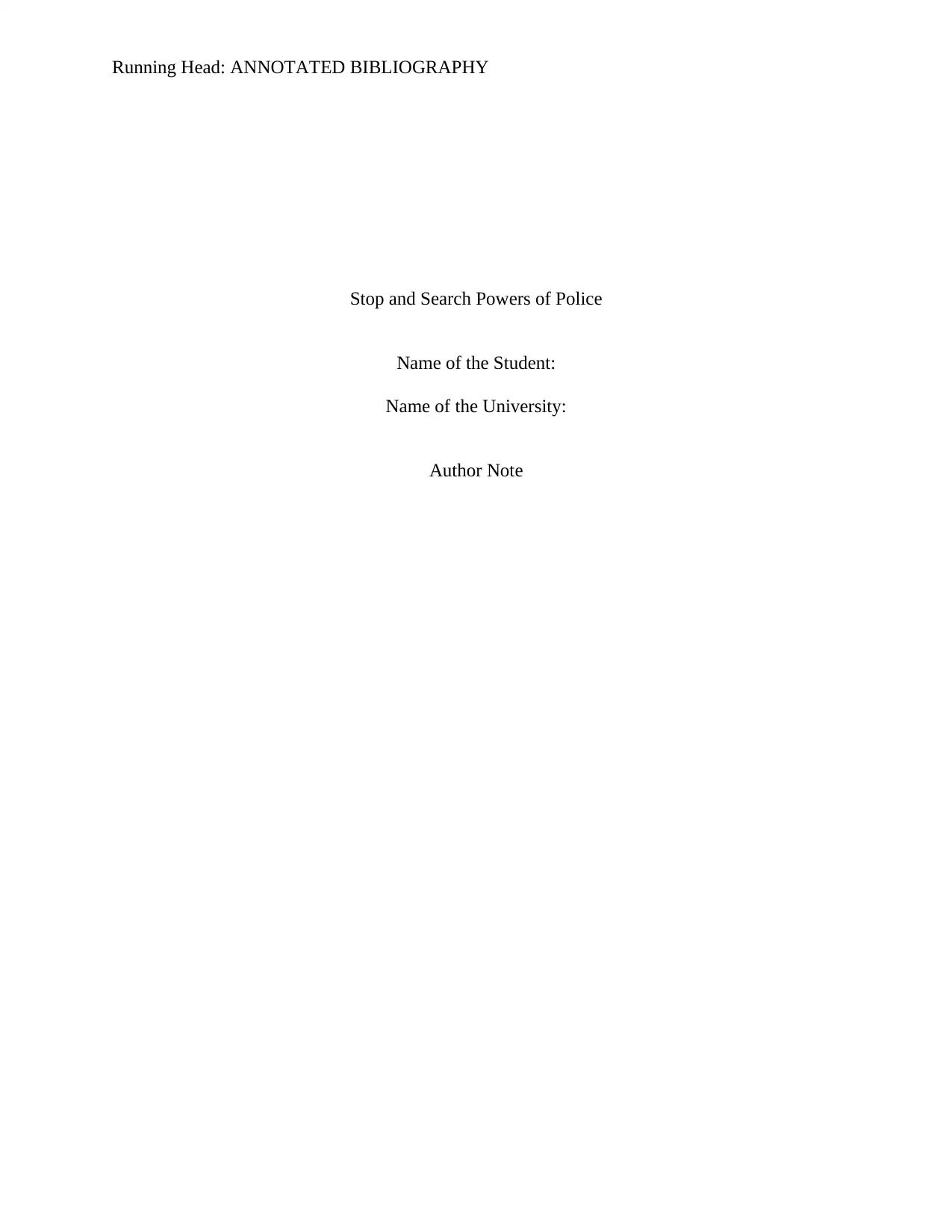
Running Head: ANNOTATED BIBLIOGRAPHY
Stop and Search Powers of Police
Name of the Student:
Name of the University:
Author Note
Stop and Search Powers of Police
Name of the Student:
Name of the University:
Author Note
Paraphrase This Document
Need a fresh take? Get an instant paraphrase of this document with our AI Paraphraser
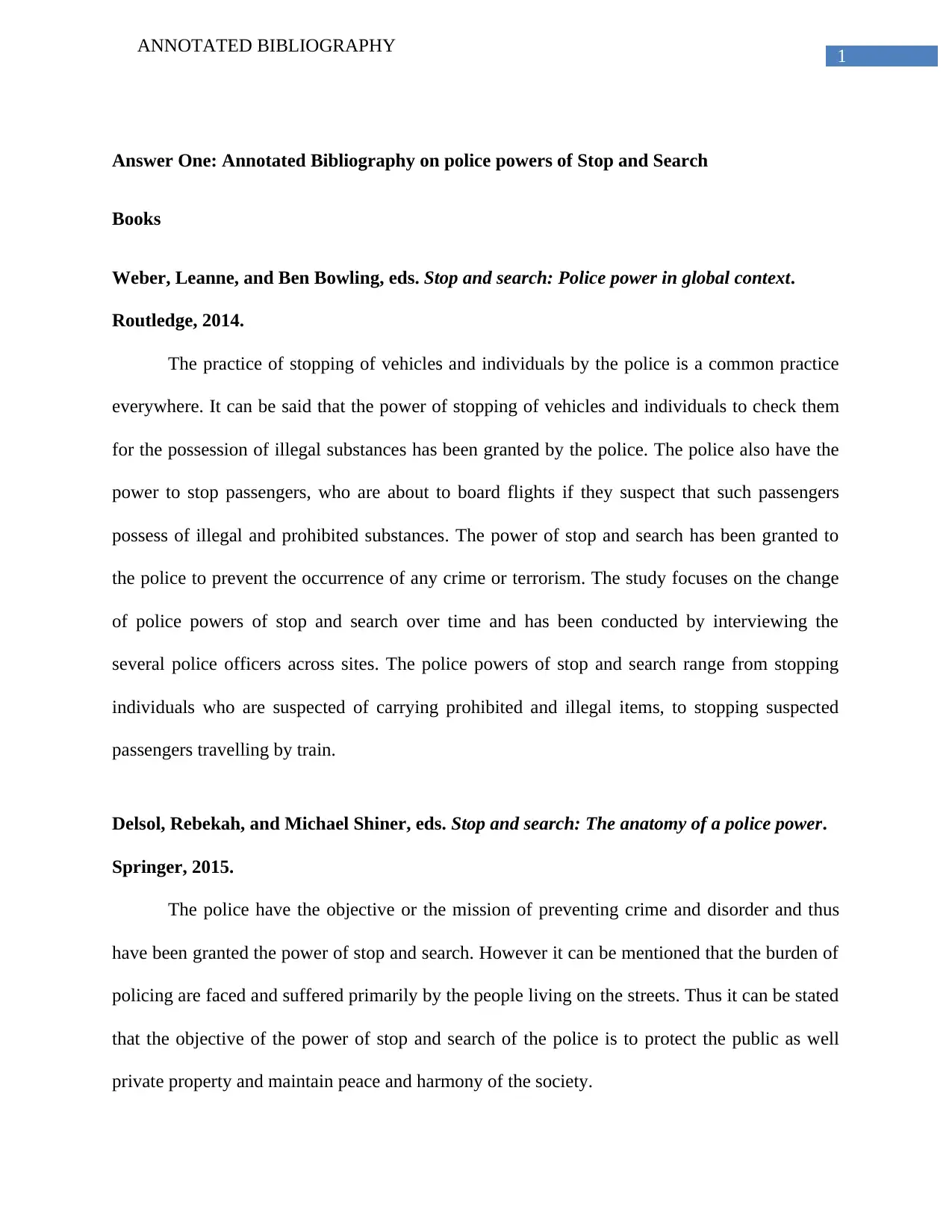
1
ANNOTATED BIBLIOGRAPHY
Answer One: Annotated Bibliography on police powers of Stop and Search
Books
Weber, Leanne, and Ben Bowling, eds. Stop and search: Police power in global context.
Routledge, 2014.
The practice of stopping of vehicles and individuals by the police is a common practice
everywhere. It can be said that the power of stopping of vehicles and individuals to check them
for the possession of illegal substances has been granted by the police. The police also have the
power to stop passengers, who are about to board flights if they suspect that such passengers
possess of illegal and prohibited substances. The power of stop and search has been granted to
the police to prevent the occurrence of any crime or terrorism. The study focuses on the change
of police powers of stop and search over time and has been conducted by interviewing the
several police officers across sites. The police powers of stop and search range from stopping
individuals who are suspected of carrying prohibited and illegal items, to stopping suspected
passengers travelling by train.
Delsol, Rebekah, and Michael Shiner, eds. Stop and search: The anatomy of a police power.
Springer, 2015.
The police have the objective or the mission of preventing crime and disorder and thus
have been granted the power of stop and search. However it can be mentioned that the burden of
policing are faced and suffered primarily by the people living on the streets. Thus it can be stated
that the objective of the power of stop and search of the police is to protect the public as well
private property and maintain peace and harmony of the society.
ANNOTATED BIBLIOGRAPHY
Answer One: Annotated Bibliography on police powers of Stop and Search
Books
Weber, Leanne, and Ben Bowling, eds. Stop and search: Police power in global context.
Routledge, 2014.
The practice of stopping of vehicles and individuals by the police is a common practice
everywhere. It can be said that the power of stopping of vehicles and individuals to check them
for the possession of illegal substances has been granted by the police. The police also have the
power to stop passengers, who are about to board flights if they suspect that such passengers
possess of illegal and prohibited substances. The power of stop and search has been granted to
the police to prevent the occurrence of any crime or terrorism. The study focuses on the change
of police powers of stop and search over time and has been conducted by interviewing the
several police officers across sites. The police powers of stop and search range from stopping
individuals who are suspected of carrying prohibited and illegal items, to stopping suspected
passengers travelling by train.
Delsol, Rebekah, and Michael Shiner, eds. Stop and search: The anatomy of a police power.
Springer, 2015.
The police have the objective or the mission of preventing crime and disorder and thus
have been granted the power of stop and search. However it can be mentioned that the burden of
policing are faced and suffered primarily by the people living on the streets. Thus it can be stated
that the objective of the power of stop and search of the police is to protect the public as well
private property and maintain peace and harmony of the society.
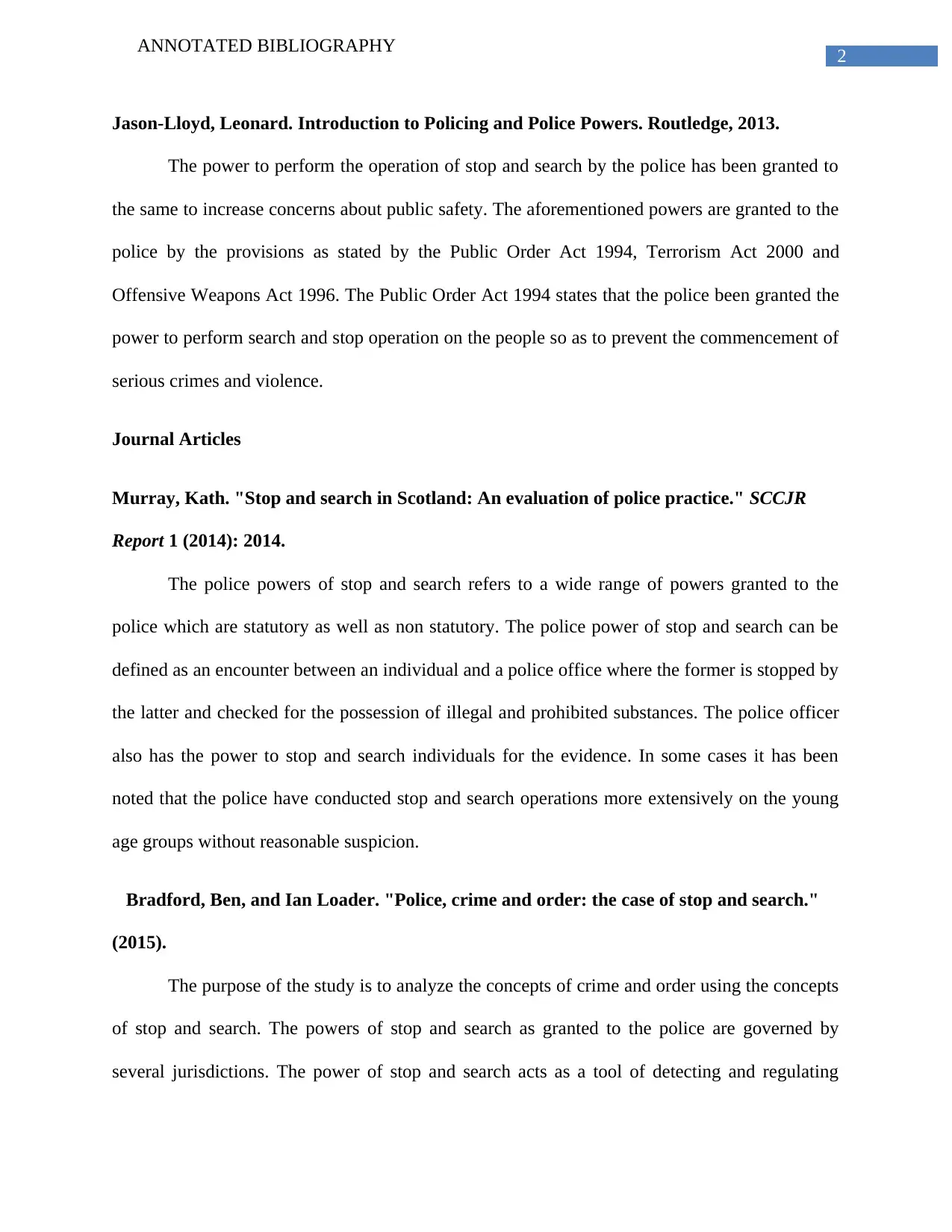
2
ANNOTATED BIBLIOGRAPHY
Jason-Lloyd, Leonard. Introduction to Policing and Police Powers. Routledge, 2013.
The power to perform the operation of stop and search by the police has been granted to
the same to increase concerns about public safety. The aforementioned powers are granted to the
police by the provisions as stated by the Public Order Act 1994, Terrorism Act 2000 and
Offensive Weapons Act 1996. The Public Order Act 1994 states that the police been granted the
power to perform search and stop operation on the people so as to prevent the commencement of
serious crimes and violence.
Journal Articles
Murray, Kath. "Stop and search in Scotland: An evaluation of police practice." SCCJR
Report 1 (2014): 2014.
The police powers of stop and search refers to a wide range of powers granted to the
police which are statutory as well as non statutory. The police power of stop and search can be
defined as an encounter between an individual and a police office where the former is stopped by
the latter and checked for the possession of illegal and prohibited substances. The police officer
also has the power to stop and search individuals for the evidence. In some cases it has been
noted that the police have conducted stop and search operations more extensively on the young
age groups without reasonable suspicion.
Bradford, Ben, and Ian Loader. "Police, crime and order: the case of stop and search."
(2015).
The purpose of the study is to analyze the concepts of crime and order using the concepts
of stop and search. The powers of stop and search as granted to the police are governed by
several jurisdictions. The power of stop and search acts as a tool of detecting and regulating
ANNOTATED BIBLIOGRAPHY
Jason-Lloyd, Leonard. Introduction to Policing and Police Powers. Routledge, 2013.
The power to perform the operation of stop and search by the police has been granted to
the same to increase concerns about public safety. The aforementioned powers are granted to the
police by the provisions as stated by the Public Order Act 1994, Terrorism Act 2000 and
Offensive Weapons Act 1996. The Public Order Act 1994 states that the police been granted the
power to perform search and stop operation on the people so as to prevent the commencement of
serious crimes and violence.
Journal Articles
Murray, Kath. "Stop and search in Scotland: An evaluation of police practice." SCCJR
Report 1 (2014): 2014.
The police powers of stop and search refers to a wide range of powers granted to the
police which are statutory as well as non statutory. The police power of stop and search can be
defined as an encounter between an individual and a police office where the former is stopped by
the latter and checked for the possession of illegal and prohibited substances. The police officer
also has the power to stop and search individuals for the evidence. In some cases it has been
noted that the police have conducted stop and search operations more extensively on the young
age groups without reasonable suspicion.
Bradford, Ben, and Ian Loader. "Police, crime and order: the case of stop and search."
(2015).
The purpose of the study is to analyze the concepts of crime and order using the concepts
of stop and search. The powers of stop and search as granted to the police are governed by
several jurisdictions. The power of stop and search acts as a tool of detecting and regulating
⊘ This is a preview!⊘
Do you want full access?
Subscribe today to unlock all pages.

Trusted by 1+ million students worldwide
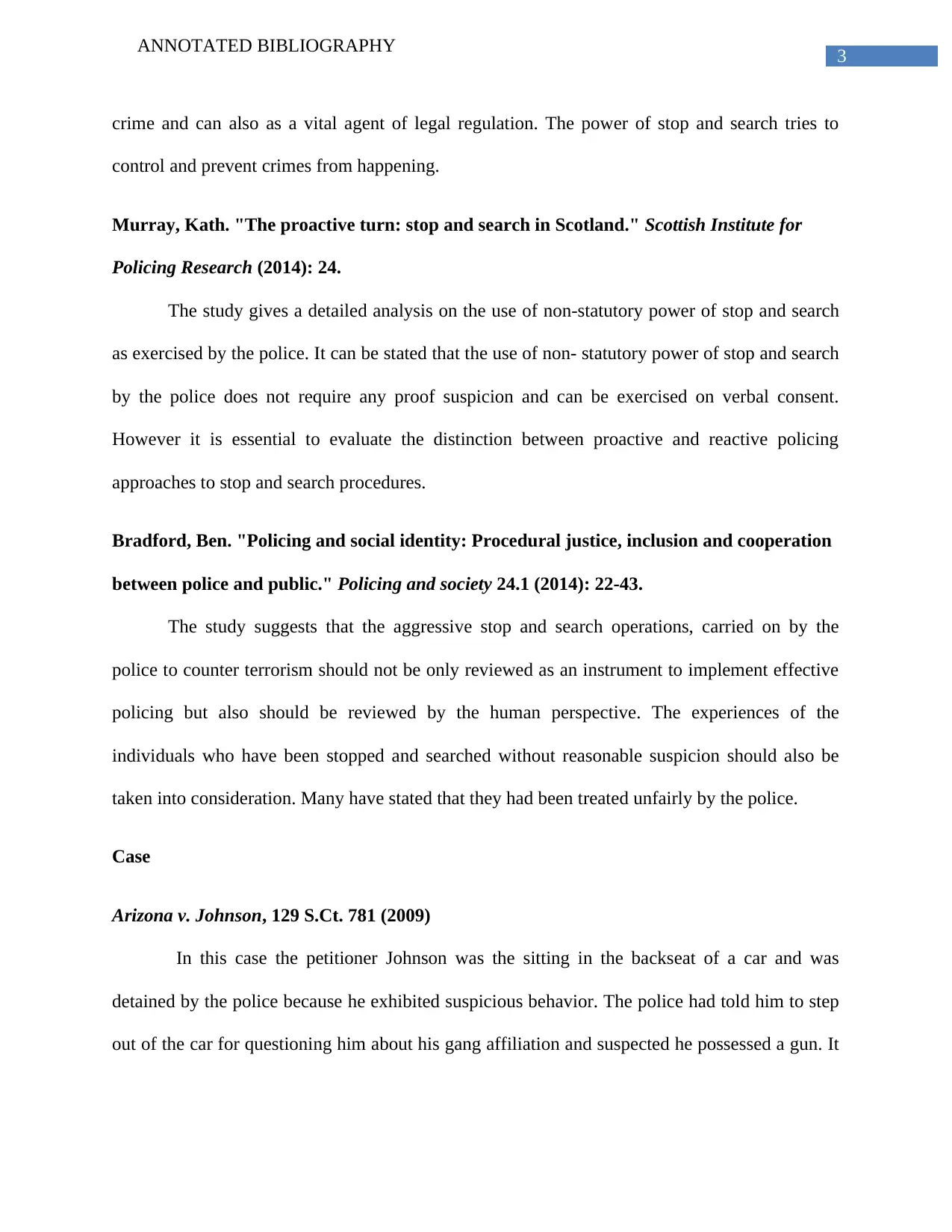
3
ANNOTATED BIBLIOGRAPHY
crime and can also as a vital agent of legal regulation. The power of stop and search tries to
control and prevent crimes from happening.
Murray, Kath. "The proactive turn: stop and search in Scotland." Scottish Institute for
Policing Research (2014): 24.
The study gives a detailed analysis on the use of non-statutory power of stop and search
as exercised by the police. It can be stated that the use of non- statutory power of stop and search
by the police does not require any proof suspicion and can be exercised on verbal consent.
However it is essential to evaluate the distinction between proactive and reactive policing
approaches to stop and search procedures.
Bradford, Ben. "Policing and social identity: Procedural justice, inclusion and cooperation
between police and public." Policing and society 24.1 (2014): 22-43.
The study suggests that the aggressive stop and search operations, carried on by the
police to counter terrorism should not be only reviewed as an instrument to implement effective
policing but also should be reviewed by the human perspective. The experiences of the
individuals who have been stopped and searched without reasonable suspicion should also be
taken into consideration. Many have stated that they had been treated unfairly by the police.
Case
Arizona v. Johnson, 129 S.Ct. 781 (2009)
In this case the petitioner Johnson was the sitting in the backseat of a car and was
detained by the police because he exhibited suspicious behavior. The police had told him to step
out of the car for questioning him about his gang affiliation and suspected he possessed a gun. It
ANNOTATED BIBLIOGRAPHY
crime and can also as a vital agent of legal regulation. The power of stop and search tries to
control and prevent crimes from happening.
Murray, Kath. "The proactive turn: stop and search in Scotland." Scottish Institute for
Policing Research (2014): 24.
The study gives a detailed analysis on the use of non-statutory power of stop and search
as exercised by the police. It can be stated that the use of non- statutory power of stop and search
by the police does not require any proof suspicion and can be exercised on verbal consent.
However it is essential to evaluate the distinction between proactive and reactive policing
approaches to stop and search procedures.
Bradford, Ben. "Policing and social identity: Procedural justice, inclusion and cooperation
between police and public." Policing and society 24.1 (2014): 22-43.
The study suggests that the aggressive stop and search operations, carried on by the
police to counter terrorism should not be only reviewed as an instrument to implement effective
policing but also should be reviewed by the human perspective. The experiences of the
individuals who have been stopped and searched without reasonable suspicion should also be
taken into consideration. Many have stated that they had been treated unfairly by the police.
Case
Arizona v. Johnson, 129 S.Ct. 781 (2009)
In this case the petitioner Johnson was the sitting in the backseat of a car and was
detained by the police because he exhibited suspicious behavior. The police had told him to step
out of the car for questioning him about his gang affiliation and suspected he possessed a gun. It
Paraphrase This Document
Need a fresh take? Get an instant paraphrase of this document with our AI Paraphraser

4
ANNOTATED BIBLIOGRAPHY
was held by the court that the detention of Johnson was justified for he was a passenger of a car
which had been stopped for insurance violation.
ANNOTATED BIBLIOGRAPHY
was held by the court that the detention of Johnson was justified for he was a passenger of a car
which had been stopped for insurance violation.
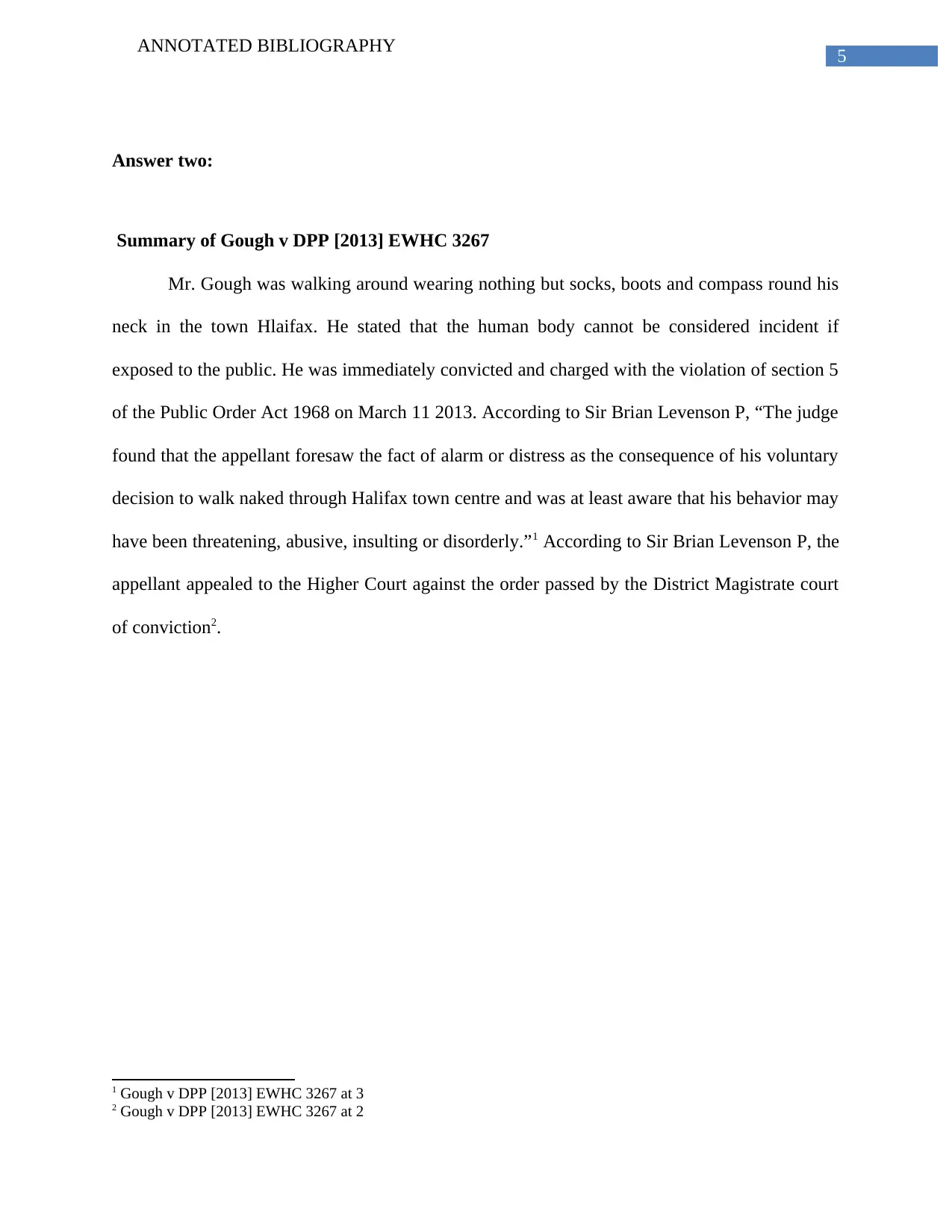
5
ANNOTATED BIBLIOGRAPHY
Answer two:
Summary of Gough v DPP [2013] EWHC 3267
Mr. Gough was walking around wearing nothing but socks, boots and compass round his
neck in the town Hlaifax. He stated that the human body cannot be considered incident if
exposed to the public. He was immediately convicted and charged with the violation of section 5
of the Public Order Act 1968 on March 11 2013. According to Sir Brian Levenson P, “The judge
found that the appellant foresaw the fact of alarm or distress as the consequence of his voluntary
decision to walk naked through Halifax town centre and was at least aware that his behavior may
have been threatening, abusive, insulting or disorderly.”1 According to Sir Brian Levenson P, the
appellant appealed to the Higher Court against the order passed by the District Magistrate court
of conviction2.
1 Gough v DPP [2013] EWHC 3267 at 3
2 Gough v DPP [2013] EWHC 3267 at 2
ANNOTATED BIBLIOGRAPHY
Answer two:
Summary of Gough v DPP [2013] EWHC 3267
Mr. Gough was walking around wearing nothing but socks, boots and compass round his
neck in the town Hlaifax. He stated that the human body cannot be considered incident if
exposed to the public. He was immediately convicted and charged with the violation of section 5
of the Public Order Act 1968 on March 11 2013. According to Sir Brian Levenson P, “The judge
found that the appellant foresaw the fact of alarm or distress as the consequence of his voluntary
decision to walk naked through Halifax town centre and was at least aware that his behavior may
have been threatening, abusive, insulting or disorderly.”1 According to Sir Brian Levenson P, the
appellant appealed to the Higher Court against the order passed by the District Magistrate court
of conviction2.
1 Gough v DPP [2013] EWHC 3267 at 3
2 Gough v DPP [2013] EWHC 3267 at 2
⊘ This is a preview!⊘
Do you want full access?
Subscribe today to unlock all pages.

Trusted by 1+ million students worldwide
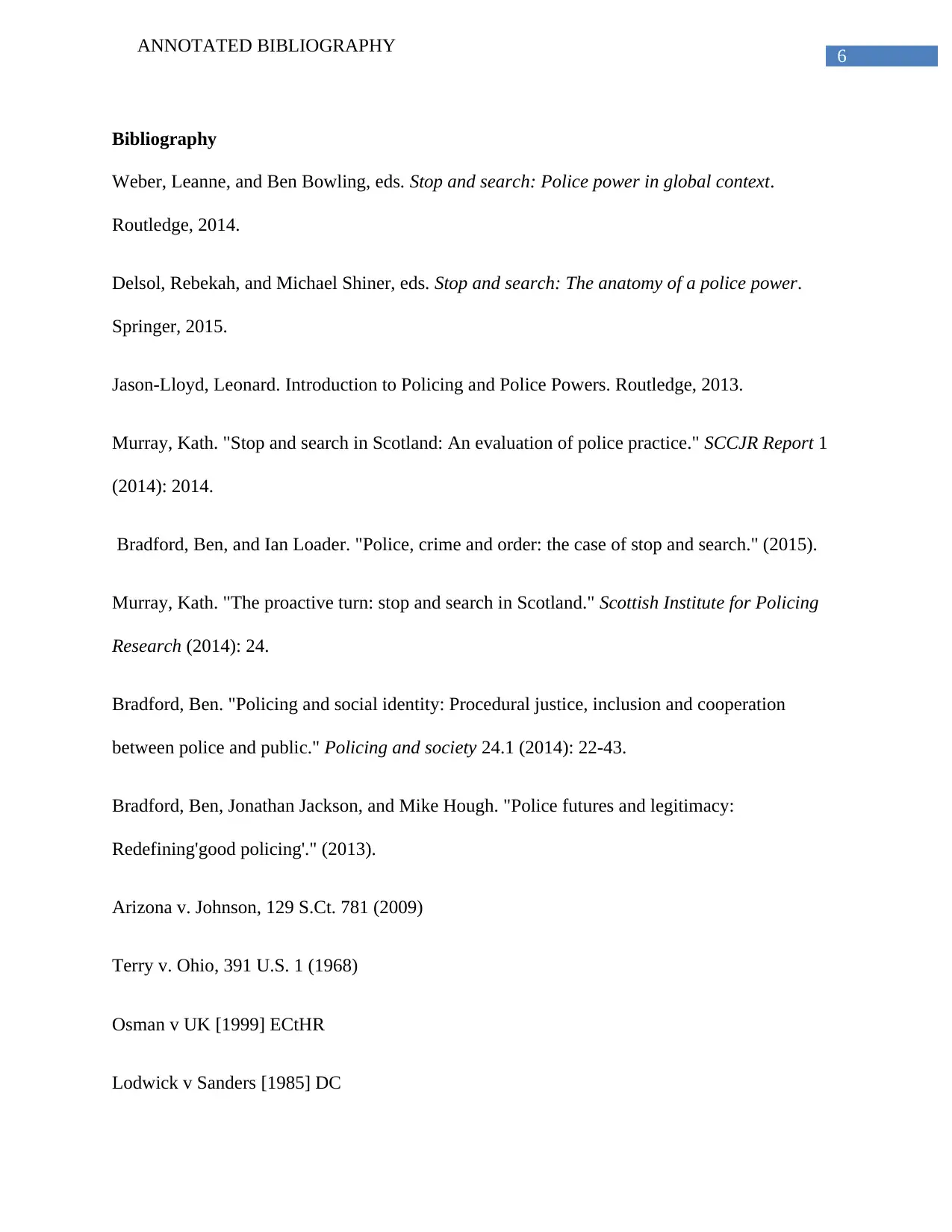
6
ANNOTATED BIBLIOGRAPHY
Bibliography
Weber, Leanne, and Ben Bowling, eds. Stop and search: Police power in global context.
Routledge, 2014.
Delsol, Rebekah, and Michael Shiner, eds. Stop and search: The anatomy of a police power.
Springer, 2015.
Jason-Lloyd, Leonard. Introduction to Policing and Police Powers. Routledge, 2013.
Murray, Kath. "Stop and search in Scotland: An evaluation of police practice." SCCJR Report 1
(2014): 2014.
Bradford, Ben, and Ian Loader. "Police, crime and order: the case of stop and search." (2015).
Murray, Kath. "The proactive turn: stop and search in Scotland." Scottish Institute for Policing
Research (2014): 24.
Bradford, Ben. "Policing and social identity: Procedural justice, inclusion and cooperation
between police and public." Policing and society 24.1 (2014): 22-43.
Bradford, Ben, Jonathan Jackson, and Mike Hough. "Police futures and legitimacy:
Redefining'good policing'." (2013).
Arizona v. Johnson, 129 S.Ct. 781 (2009)
Terry v. Ohio, 391 U.S. 1 (1968)
Osman v UK [1999] ECtHR
Lodwick v Sanders [1985] DC
ANNOTATED BIBLIOGRAPHY
Bibliography
Weber, Leanne, and Ben Bowling, eds. Stop and search: Police power in global context.
Routledge, 2014.
Delsol, Rebekah, and Michael Shiner, eds. Stop and search: The anatomy of a police power.
Springer, 2015.
Jason-Lloyd, Leonard. Introduction to Policing and Police Powers. Routledge, 2013.
Murray, Kath. "Stop and search in Scotland: An evaluation of police practice." SCCJR Report 1
(2014): 2014.
Bradford, Ben, and Ian Loader. "Police, crime and order: the case of stop and search." (2015).
Murray, Kath. "The proactive turn: stop and search in Scotland." Scottish Institute for Policing
Research (2014): 24.
Bradford, Ben. "Policing and social identity: Procedural justice, inclusion and cooperation
between police and public." Policing and society 24.1 (2014): 22-43.
Bradford, Ben, Jonathan Jackson, and Mike Hough. "Police futures and legitimacy:
Redefining'good policing'." (2013).
Arizona v. Johnson, 129 S.Ct. 781 (2009)
Terry v. Ohio, 391 U.S. 1 (1968)
Osman v UK [1999] ECtHR
Lodwick v Sanders [1985] DC
Paraphrase This Document
Need a fresh take? Get an instant paraphrase of this document with our AI Paraphraser
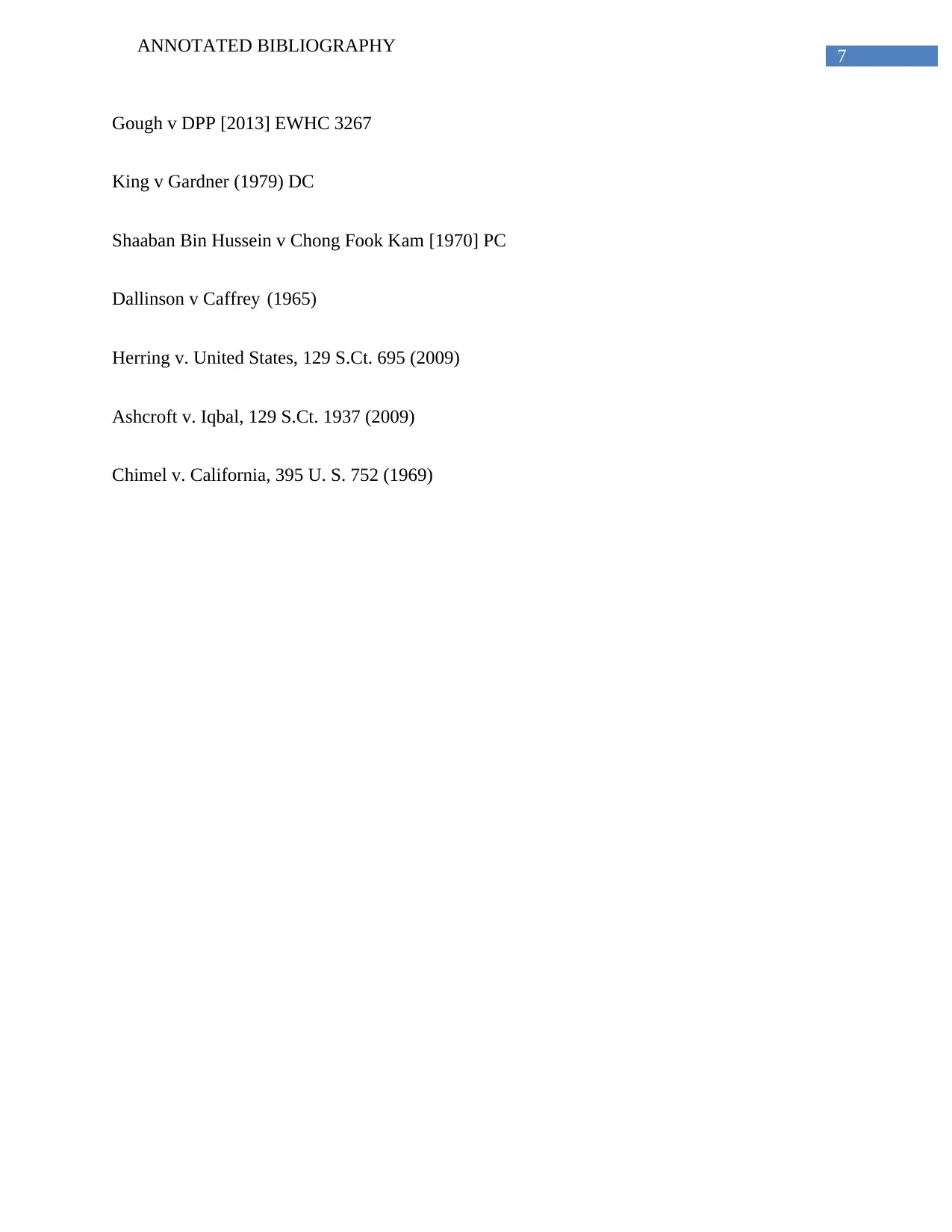
7
ANNOTATED BIBLIOGRAPHY
Gough v DPP [2013] EWHC 3267
King v Gardner (1979) DC
Shaaban Bin Hussein v Chong Fook Kam [1970] PC
Dallinson v Caffrey (1965)
Herring v. United States, 129 S.Ct. 695 (2009)
Ashcroft v. Iqbal, 129 S.Ct. 1937 (2009)
Chimel v. California, 395 U. S. 752 (1969)
ANNOTATED BIBLIOGRAPHY
Gough v DPP [2013] EWHC 3267
King v Gardner (1979) DC
Shaaban Bin Hussein v Chong Fook Kam [1970] PC
Dallinson v Caffrey (1965)
Herring v. United States, 129 S.Ct. 695 (2009)
Ashcroft v. Iqbal, 129 S.Ct. 1937 (2009)
Chimel v. California, 395 U. S. 752 (1969)

8
ANNOTATED BIBLIOGRAPHY
ANNOTATED BIBLIOGRAPHY
⊘ This is a preview!⊘
Do you want full access?
Subscribe today to unlock all pages.

Trusted by 1+ million students worldwide
1 out of 9
Related Documents
Your All-in-One AI-Powered Toolkit for Academic Success.
+13062052269
info@desklib.com
Available 24*7 on WhatsApp / Email
![[object Object]](/_next/static/media/star-bottom.7253800d.svg)
Unlock your academic potential
Copyright © 2020–2026 A2Z Services. All Rights Reserved. Developed and managed by ZUCOL.





